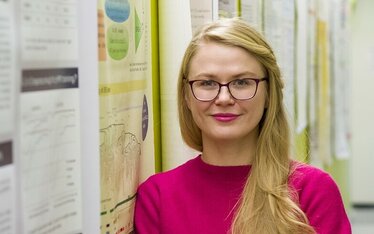Research group of genomic epidemiology
Our research focuses on different aspects of genetic epidemiology to determine the genetic causes of complex diseases, including women’s health, male reproductive health, inflammatory diseases, and metabolic diseases.
One of our subtopics is the genetics of women’s health, including both gynecological and obstetrical diagnoses, as well as sex differences in systemic diseases. To better understand the determinants of reproductive health, we have now also started to look into the genetics of male reproductive phenotypes. As a new and exciting angle, we have started looking at pharmacogenomics of contraceptives and other hormonal drugs.
TIIMIPILT KAS PÄISESSE VÕI SIIA TEKSTI VAHELE
Part of our team works on optimal methods for genetic risk estimation both for binary and continuous traits as well as for projecting genetic risk onto absolute risk scale, stratifying risk trajectories both by country, age and sex across 18 diseases. We have also worked on phenotype harmonization and focused on analysis validating the harmonization process. As part of it, we have measured relative effective dilution - a statistics quantifying phenotype misclassification and its effect on genome-wide association studies - and explored its effect on polygenic risk score predictive ability.
Our third focus is on understanding the genetics behind the pathogenesis of arthritides (mainly focusing on osteoarthritis) and endoprosthesis failure. Currently we have two active projects in this direction: (1) SpatialArth (Uncovering the mechanisms of osteoarthritis in human knee applying spatial transcriptomics), where we add spatial dimension to transcriptome and proteome data from knee joint tissues from OA patients; (2) GenArth (Genetic basis of the pathogenesis of arthritides and endoprosthesis failure). Both projects aim towards better understanding of the pathogenesis of arthritides and endoprosthesis failure.
Principal investigators
Postdoctoral researchers

Projects:
INTERVENE - International consortium for integrative genomics prediction

Projects:
Traits related to human papilloma virus, including cervical cancer.

Projects:
ENDOTARGET - Systemic Endotoxemia as the driver of chronic inflammation - Biomarkers and novel therapeutic targets for Arthritis
OPTOMICS - Combining optoacoustic imaging phenotypes and multi-omics to advance diabetes healthcare
SpatialArth - Uncovering the mechanisms of osteoarthritis in human knee applying spatial transcriptomics
GenArth - Genetic basis of the pathogenesis of arthritides and endoprosthesis failure
PhD students

Supervisors: Reedik Mägi, Andrew Morris, Andres Salumets, Andres Metspalu
Projects: Structural variant methodology and associations; BRaVa consortium

Supervisors: Triin Laisk, Reedik Mägi, Terhi Piltonen, Riikka Arffman
Projects: PCOS consortium, MATER consortium, Multi-omic analysis of cervical cancer and related endpoints; Genome-wide association studies and their applications to the study of different female reproductive health conditions

Supervisors: Reedik Mägi,Triin Laisk, Maris Laan and Margus Punab
Projects: Uncovering the Shared Genetic Components of Thyroid Disorders and Reproductive Health; Genetics of male reproductive traits and their shared molecular mechanisms with risk factor diseases; Klinefelter syndrome in Estonia

Supervisors: Reedik Mägi, Triin Laisk, Kristi Läll
Projects: Sex and Ancestry Specific Genetic Risk Prediction for Type 2 Diabetes and Gestational Diabetes

Supervisors: Ene Reimann, Reedik Mägi, Triin Laisk, Elin Org
Projects: Systemic Endothoxemia as the driver of chronic inflammation: Novel Biomarkers and Risk Prediction Models in Rheumatic Diseases

Supervisors: Triin Laisk, Lili Milani, Reedik Mägi
Projects: Pharmacogenetic aspects of hormonal contraceptives
Staff
Projects: INTERVENE
Dissertations under supervision
Maarja Jõeloo „Imputation and analysis of gene expression data using reproductive health associated phenotypes“
Degree: Doctor's Degree
Supervisors: Reedik Mägi; Andrew Paul Morris; Andres Salumets; Andres Metspalu
Natalia Pujol Gualdo „Personalised medicine for female family planning“
Degree: Doctor's Degree
Supervisors: Triin Laisk; Terhi Piltonen; Reedik Mägi; Riikka Arffman
Jéssica Figuerêdo „Shared genetic risk factors of male infertility and reproductive traits“
Degree: Doctor's Degree
Supervisors: Reedik Mägi; Maris Laan; Triin Laisk; Margus Punab
Jelisaveta Džigurski „Pharmacogenetic aspects of hormonal contraceptives“
Degree: Doctor's Degree
Supervisors: Triin Laisk; Lili Milani; Reedik Mägi
Galadriel Lucia Velazquez Silva „Systemic Endotoxemia as the driver of chronic inflammation“
Degree: Doctor's Degree
Supervisors: Ene Reimann; Elin Org; Triin Laisk; Reedik Mägi
Valentina Rukins „Sex and Ancestry Specific Genetic Risk Prediction for Type 2 Diabetes and Gestational Diabetes“
Student: Degree: Doctor's Degree
Supervisors: Reedik Mägi; Kristi Läll; Triin Laisk
Andreas-Christian Hade „Substance abuse related molecular biologic changes in the human brain“
Degree: Doctor's Degree
Supervisor: Marika Väli; Ene Reimann; Mari-Anne Philips; Sulev Kõks
Overview of ongoing projects
01.01.2024–31.12.2030, Principal Investigator: Reedik Mägi
Funding: Ministry of Education and Research, 6 999 946 EUR
As Estonia’s population ages, the national healthcare system faces challenges. We focus on key advancements in research the transformation of healthcare needs in the era of personalized medicine (PM). We will (i) create risk prediction models that consider explicitly ancestry, sex, age, and lifestyle factors. These models aim to predict chronic health disorders earlier, improving patient outcomes, reducing costs, and offering PM for the whole society; (ii) explore differences in perception of PM in the society to tailor dissemination activities; (iii) develop novel biomarkers using immunoprofiles & cell-free DNA enhancing multi-omic risk models; (iv) validate the feasibility of PM approaches for early detection of parkinsonism and lipid lowering intervention for ischemic heart disease. Genetic insights and early markers enable advanced tools for predicting disease risks, promoting early interventions, and reducing healthcare burdens.
01.01.2023–31.12.2027, Principal Investigator: Reedik Mägi
Funding: Estonian Research Council, 384 800 EUR
Complex traits, which have both genetic and nongenetic component, such as diabetes, represent a considerable burden to the healthcare system and quality of life. These conditions arise from a complex interaction between individual genetic variation, environmental and lifestyle factors. The summary statistics obtained from genome-wide association studies can be used to create polygenic risk scores (PRS) that summarize the effect of many genetic variants on a trait or disease and can be used to stratify individuals into different risk groups for risk prediction. We plan to develop and implement a novel methodology for PRS calculation based on a meta-regression transethnic meta-analysis framework to calculate scores for people with different ethnic backgrounds. We plan to to use this methodology in various international consortia that work with people of non-European or mixed ethnic backgrounds and to use UK and Estonian Biobanks data for model validation.
02.09.2019–31.01.2027, Principal Investigator: Reedik Mägi
Funding: Geneto OÜ, 118 876 EUR
During collaboration genetic risk scores will be developed in three stages for the following phenotypes: lactose intolerance, glucose intolerance, elevated body mass index, high blood sugar, high LDL cholesterol, Type II diabetes, increased waist to hip ratio and higher blood pressure.
01.01.2023–31.12.2026, Principal investigator: Reedik Mägi
Funding: : European Commission, 598 000 EUR
In this project, we explore the role of intestinal microbiota derived immunologically highly active bacterial wall lipopolysaccharides (LPS), as drivers in the transition from health to disease. A focus will be on rheumatoid arthritis (RA), osteoarthritis (OA), and spondylarthritis (SpA). Together these diseases affect more than 5% of the world’s population. The objectives are to elucidate the causal relationships between microbiota and intestinal permeability and their association with increased serum LPS levels (endotoxemia) and the risk of RA, OA and SpA. Further objective is to find means to reduce chronic inflammation to prevent onset of disease and to develop preventive recommendations. Objectives will be achieved by i) determining in large cohorts of people composition of intestinal microbiota, markers of permeability and degree of endotoxemia and search their associations with the risk RA, OA and SpA, and to identify novel biomarkers by extensive OMICS based analyses. ii) performing targeted clinical studies to obtain samples of microbiota and intestinal tissue and search for association between microbiota, intestinal inflammation, intestinal permeability, endotoxemia and disease activity. iii) performing in vitro studies to elucidate the impact of LPS, derived from different bacteria, on target tissue by using tissue explant cultures and organ on chip models of intestinal and joint tissue iv) using animal models to study the role of LPS in OA pathogenesis V) performing interventional studies in patients with RA or SpA to find means to reduce endotoxemia by altering the intestinal microbiota by modifying diet or by fecal transplantation or by reducing the gut permeability using targeted drugs. The studies establish an important driver of chronic inflammation and introduce novel treatments. AI based analysis will help to discover novel biomarkers and to create recommendations to reduce chronic inflammation and to prevent transition from health to disease.
01.01.2021–31.12.2025, Principal Investigator: Reedik Mägi
Funding: European Commission, 1 120 656 EUR
The aim of INTERVENE is to develop and test next generation tools for disease prevention, diagnosis, and personalised treatment utilizing the first US-European pool of genomic and health data and integrating longitudinal and disease-relevant -omics data into genetic risk scores. Resulting in unprecedented potential for prediction, diagnosis, and personalised treatments for complex and rare diseases. Some of the largest biobanks in Europe and two in the USA will be securely linked and harmonized in a GDPR-compliant repository with data from more than 1.7 million genomes. INTERVENE will demonstrate the potential and benefits of powerful AI technologies on the next generation of integrative genetic scores (IGS). The clinical and economic benefits of IGS will be evaluated in key disease areas with major public health burden. Here, the newly developed IGS will be taken into a clinical environment and their real-world benefits will be evaluated together with clinical experts, European patient advocate groups and medical societies and considering regulatory and ethical implications. Thus, a framework for legally and ethically responsible translation into wider clinical practice will be developed. Moreover, the partners will develop and test the role of IGS in several rare diseases as well as COVID-19 infection and severity. Importantly, to support the application of IGS via public-private partnerships including clinical practitioners, an AI-enabled federated data analysis platform, the ‘IGS4EU’ platform, will be developed for automated IGS generation and interpretation for end-users. Additionally, the IGS4EU platform will allow access of the INTERVENE data and the methodology know-how to the AI community through a competition-based benchmarking environment. In the long term, the IGS4EU platform aims to grow disease coverage and enable wide adoption of IGS as a gold standard in clinical research and practice.
01.01.2022 - 31.12.2025, Principal Investigator: Triin Laisk
Funding: Estonian Research Council, 141 125,00 EUR
Cervical cancer is common among women (more than 311 000 deaths worldwide every year). However, underlying genetic factors and molecular changes are not entirely understood, hindering development of novel treatments and genetic risk predictors. The aim of the project is to increase the knowledge on the biology of cervical cancer to develop a personalised approach and augment the screening and vaccination strategies for early detection and prevention of the disease. We will do this by combining clinical phenotypes and novel granular subphenotypes (such as cellular phenotypes derived from histology images with computer vision) with cutting edge computational approaches. We will then translate this to genetic risk prediction tools. These analyses give new knowledge on the genetic background, while also highlighting novel ways for more personalised patient counselling to decrease the risk of cervical cancer and associated comorbidities.
Major publications
Koel M, Võsa U, Jõeloo M, Läll K, Gualdo NP, Laivuori H, Lemmelä S; Estonian Biobank Research Team; FinnGen; Daly M, Palta P, Mägi R, Laisk T. GWAS meta-analyses clarify the genetics of cervical phenotypes and inform risk stratification for cervical cancer. Hum Mol Genet. 2023 Jun 5;32(12):2103-2116. doi: 10.1093/hmg/ddad043. PMID: 36929174; PMCID: PMC10244231.
Pujol-Gualdo N, Läll K, Lepamets M; Estonian Biobank Research Team; Rossi HR, Arffman RK, Piltonen TT, Mägi R, Laisk T. Advancing our understanding of genetic risk factors and potential personalized strategies for pelvic organ prolapse. Nat Commun. 2022 Jun 23;13(1):3584. doi: 10.1038/s41467-022-31188-5. PMID: 35739095; PMCID: PMC9226158.
Pervjakova, N., Moen, G.H., Borges, M.C., Ferreira, T., Cook, J.P., Allard, C., Beaumont, R.N., Canouil, M., Hatem, G., Heiskala, A., Joensuu, A.,… Mägi, R., 2022. Multi-ancestry genome-wide association study of gestational diabetes mellitus highlights genetic links with type 2 diabetes. Human molecular genetics, 31(19), pp.3377-3391.
Laisk T, Lepamets M, Koel M, Abner E; Estonian Biobank Research Team; Mägi R. Genome-wide association study identifies five risk loci for pernicious anemia. Nat Commun. 2021 Jun 18;12(1):3761. doi: 10.1038/s41467-021-24051-6. PMID: 34145262; PMCID: PMC8213695.
Lagou, V., Mägi, R., Hottenga, J.J., Grallert, H., Perry, J.R., Bouatia-Naji, N., Marullo, L., Rybin, D., Jansen, R., Min, J.L. and Dimas, A.S., 2021. Sex-dimorphic genetic effects and novel loci for fasting glucose and insulin variability. Nature communications, 12(1), p.24.
Mägi, R., Suleimanov, Y.V., Clarke, G.M., Kaakinen, M., Fischer, K., Prokopenko, I. and Morris, A.P., 2017. SCOPA and META-SCOPA: software for the analysis and aggregation of genome-wide association studies of multiple correlated phenotypes. BMC bioinformatics, 18, pp.1-8.
Mägi, R., Horikoshi, M., Sofer, T., Mahajan, A., Kitajima, H., Franceschini, N., McCarthy, M.I., COGENT-Kidney Consortium, T2D-GENES Consortium and Morris, A.P., 2017. Trans-ethnic meta-regression of genome-wide association studies accounting for ancestry increases power for discovery and improves fine-mapping resolution. Human molecular genetics, 26(18), pp.3639-3650.


